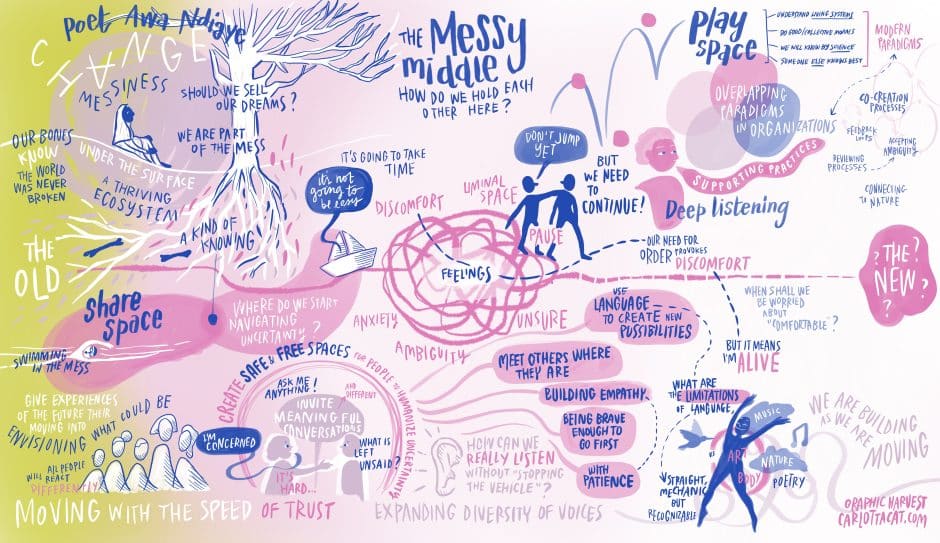Systems Innovation Learning Festival: Day Two

In 2021, Climate KIC and Sida launched the Systems Innovation Learning Partnership to bring together organisations and people to collaborate, experiment, learn and share ideas that help to support innovation and transformation across whole systems. In this series, we will be hearing insights from three of the partnership’s learning practitioners as they reflect on this year’s edition of the Systems Innovation Learning Festival, which took place earlier in June.
Following the first day of the festival, which focused on how we might rethink traditional collaboration patterns and organisational structures, we began the second day with a renewed appetite for learning. The ambition was to explore the process of change, and in particular, the liminal space between conventional models and new ways of working. We call this place of ambiguity, confusion and uncertainty, ‘the messy middle,’ and we were interested to hear from practitioners and individuals about their experiences from within.
Before our discussions commenced, we were joined by the poet Awa Ndiaye, whose beautifully crafted words were a welcome invitation to thought. “Perhaps change happens in the messiness of it all” she mused, before concluding that “the world was never broken – we were just looking at it through a broken self.”
Leading from the possible
We began by considering how we hold the balance of encouraging people to take a leap into new ways of working and meeting them where they are. How do we, as practitioners, lead from what is possible?
This seemed to hinge on the creation of different experiences, conversations and means of engagement. For the independent consultant Emma Proud, this might begin with “playful activities or perhaps using music,” as this new energy often allows people to gain a sense of the future into which they are moving.
Larissa Setaro, of the International Institute for Environment and Development (IIED), acknowledged that it is important to bring people along on the journey, and in particular, “to show why we’re moving from the old to the new and that it’s not going to be easy.” The OECD’s Mariana Mirabile agreed that initiating an inclusive, honest dialogue is essential, before adding: “when people begin to see the need for change – that is the opportunity to engage them.”
Moving at different speeds
In our desire for progress, we must keep in mind that groups are a collection of individuals. How do we accept and embrace the variance in people’s responses to the speed of change? We agreed that it is crucial for practitioners to role-model patience and empathy, and to lead the way in understanding that the point is to achieve diversity, not full alignment.
Luong Nguyen, based at the UNDP Accelerator Lab in Vietnam, shared his experience of modelling behaviour and suggested that this could be as simple as “willing to be the first person to look stupid in front of the entire group.” When we show our own vulnerability and openness to failure, we create a shared understanding that this is acceptable.
Larissa added to this – explaining that communication and availability are crucial when managing this variation in response to change. “Show people where we’re at and hold ‘ask me anything’ sessions – as well as creating safe spaces.” Caeser Kimbugwe, Head of Programmes at WaterAid Uganda, added that “safe spaces really have to be safe,” as anything less will erode the collective trust.
We concluded that groups will move at different speeds but when there is a culture of openness, we can be mindful of the individual.
Limitations of language
We look to words to give us possibility, but what is the limitation of language when we build something new? And how do we pay attention to the tension of needing to use simple, familiar language while holding true to the complexity of systemic work?
Emma immediately responded to this with a wonderful thought: “we try to capture the complexity of systems with linear words and sentences, but what if we used new languages like art, nature, poetry or the body?” Indeed, creative forms of language, such as metaphors, can be powerful when building a shared understanding of complex concepts.
However, this too has its limitations. As acknowledged by Mariana: “if we are constantly attaching our thoughts to things we already know, how can we begin to imagine the things we don’t know?” And what about English – the language that we most frequently use? Luong invited us to consider the implications of “not using our mother tongues, and thus, the languages of our heart.”
Getting comfortable with discomfort
As we brought our conversation to a close, it became clear that because we are looking at a dissonant system, it would be concerning if we were comfortable with this. Therefore, we have to work within the tension of needing to create spaces of psychological safety while training collectively for the discomfort that real growth needs.
As a continuation of our learning and practice, we are hosting a series of open conversations, or Deep Dives open to the public:
- 6 September 2023 – Leadership
- 27 September 2023 – New narratives and visioning
- 25 October 2023 – Confusion and crisis
- 22 November 2023 – Rethinking funding institutions
- 14 December 2023 – Radical collaboration
We are seeing an increased appetite to learn and co-create as members of the systems innovation community. If you would like to explore ways in which we can expand the field and convene more spaces of collaboration, please contact: silp@climate-kic.org
